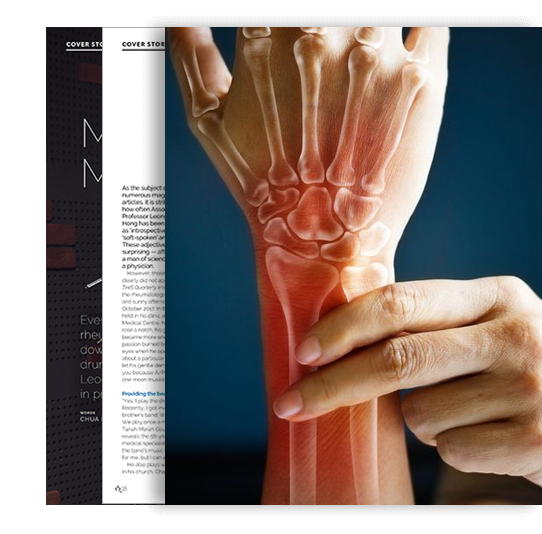
Pain in
the Joint
2016

All of them are related to the joints — the places where your bones connect, such as your wrists, knees, hips or fingers. But some types of arthritis can also affect other connective tissues and organs, including your skin.
The types of arthritis range from osteoarthritis in older people, which is related to wear and tear of cartilage (the cushions on the ends of your bones), to types of arthritis in young people associated with inflammation resulting from too much crystal formation in the joints, such as in gout. An overactive immune system can cause inflammation in conditions such as rheumatoid arthritis and psoriatic arthritis.
Arthritis is frequently thought of as a condition affecting older people. While it becomes more common as we age, young people and even children can fall prey to it.
An athletic injury such as a torn ligament or a fracture near a joint can lead to the wear-andtear type of arthritis at a much earlier age than usual.
Juvenile idiopathic rheumatoid arthritis is a group of arthritis that affects patients aged 16 or younger. It includes forms of arthritis that affect adults aged 20–50 such as rheumatoid arthritis, psoriatic arthritis and ankylosing spondylitis, except that it starts at a younger age. These are all autoimmune disorders in which the body mistakenly identifies some of its own cells and tissues as foreign. The immune system, which normally helps to fight off harmful, foreign substances such as bacteria or viruses, begins to attack healthy cells and tissues. The result is inflammation, which results in redness, swelling, warmth and soreness in the joints. Any joint can be affected, while the inflammation may limit the mobility of affected joints.
While arthritis cannot be cured, treatment can reduce joint inflammation and pain, prevent joint damage and help keep your joints working. Medications used to treat rheumatoid arthritis work to slow the disease or stop problems it causes. If you have a lot of joint damage or pain, your doctor may recommend surgery.
Some people with rheumatoid arthritis get relief from using moist heat, acupuncture and relaxation exercises. Check with your doctor before you start taking supplements as they can cause side effects and may not interact well with your medications.
Regular workouts can help relax stiff, painful joints. They also keep the bones strong. Choose exercises such as gentle stretching, resistance training and water aerobics. Proceed with caution when it comes to activity that puts pressure on the joints, such as jogging or weightlifting. It would be prudent to work with a trained professional, such as a physiotherapist.
When you have a flareup, take a short break from exercise.
It is common for people to blame increased joint pain on the weather. But can joint pain actually predict weather changes or is this an old wives’ tale? Strangely enough, there is some validity to the claim.
Weather changes can trigger an arthritic flare-up because arthritic joints have abnormal nerve endings that emit more pain signals when air temperature or air pressure changes, for example, when it is about to rain. This is true for any type of arthritis. However, weather does not cause the arthritis — it is simply a trigger for symptoms to increase. Not all patients are affected in the same way.
Weather changes can trigger an arthritic flare-up because arthritic joints have abnormal nerve endings that emit more pain signals when air temperature or air pressure changes, for example, when it is about to rain. This is true for any type of arthritis. However, weather does not cause the arthritis — it is simply a trigger for symptoms to increase.
If the rainy weather is increasing their joint pain, arthritis sufferers can apply a heating pad to their painful joints. Heat lets muscles relax, so it’s a soothing way to help with stiffness, but not necessarily pain or swelling.
People in chronic pain often feel anxious, depressed and irritable. Learning how to improve your mood is important. Break things down into bitesized parts. Learn how to pace yourself, and figure out how to improve your sleep.
Smoking is one of the most common triggers for rheumatoid arthritis. It will speed up the damage this condition does to your joints, and can also make it more likely for you to get bumps under your skin, known as rheumatoid nodules.
Smoking can also stop your rheumatoid arthritis medicine from working as well as it should. This makes it harder for you to control flare-ups or to remain in remission.